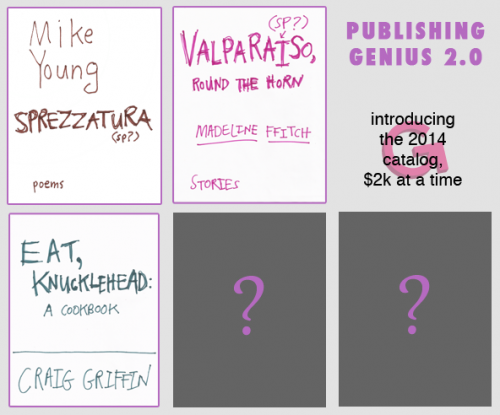Because you missed it, Zach German and Adam Humphreys’ disquieting short film “Baseball” is now streaming at portable.tv (scroll down to read a review by Jimmy Chen). See me in the credits and in the deleted scene, to be released never. Full disclosure, portable.tv is the former employer of my horrifically terrible [unnamed] ex-roommate, whose writing and alleged Australian work visa make me want burn New York City to the ground and fight to repeal the first amendment.
25 Points: Brushes With
 Brushes With
Brushes With
by Kristina Marie Darling
BlazeVOX [books], 2013
50 pages / $16.00 buy from BlazeVOX or Amazon
1. This is Kristina Marie Darling’s 11th book of poetry; she is not even 30 years old yet.
2. Darling eschews traditional forms of poetry in favor of her own unique formal constraints: the use of footnotes, appendixes, images, definitions, bracketed verse, and erasure poetry. However, in Brushes With, Darling adds a new form to her repertoire: the narrative prose poem.
3. The collection begins: “We were no longer in love. The sky, too, was beginning to show its wear.” From this point forward, readers are plunged into many complex layers of the rubble of abandonment and loss.
4. The footnotes serve as historical commentary on the prose text. This makes for a matrix-like experience. We are reading a person’s intimate words, but we also know that this text has been abandoned, then found, then studied, then put on display. This technique makes the experience of reading the prose poems feel illicit in some way. We are peering into a labyrinth of secrets that are not meant for our eyes, yet are now uncomfortably preserved and public.
5. Even while reminiscing on the relationship before its end, the speaker foreshadows doom: “You told me there was dark matter I couldn’t see. That every star is a dead star.”
6. The imagery, like the one above, proves to be richly complex. All stars are dead; therefore, that which enchants us, that which we wish upon, that which we map out, gaze upon, pray to, is also doomed. In every romantic union, there is something dark that we don’t see coming, yet we should be aware that it’s there.
7. In “Feminism,” the speaker states: “I began to realize the significance of this gesture. What is love but a parade of memorable objects, a row of dead butterflies pinned under glass?” Ouch!
8. The speaker’s take on love is relentlessly jaded, yet she comes to sharp edged truths. What is love but our desire to possess, collect, admire. Yet, in doing so, we must sacrifice the subject’s life.
9. Footnote 18. ‘This statue of the Holy Mother would later be found headless in a tiny museum in northern France.” Once again, we have worship, mementoes, collection, ownership—all leading to destruction. Facelessness.
10. The marriage documented in the book unravels due to affairs. READ MORE >
August 20th, 2013 / 5:22 pm
Which comics do you consider the most essential reading? (Comics = comic books, comix, comic strips, web comics, more?)
“I’m not sorry, it was the kind of year I would have raised all of hell to keep him around.” — raging hard as a hungry stomach noise on “How We Killed Whitney Houston” by Eric Tran at Hobart
Double-Mint Your Reward Prize Publishing Genius 2.0 Kickstarter SWEEPSTAKES
Publishing Genius Press needs no introduction here. We are always loving and writing about PGP books, from “modern classics” like Easter Rabbit by Joe Young and Pee On Water by Rachel B. Glaser, all the way to “instant classics” like Night Moves by Stephanie Barber and Fun Camp by Gabe Durham. PGP is like the utility infielder of small-press literature: it can play any position (genre) reliably and look good while doing it (design). Except with also hitting lots of home runs, home runs with titles like Light Boxes and Meat Heart, if home runs had titles, which in this metaphor they do.
Nor does PGP company man Adam Robinson need an introduction. He writes for here. Here at HTMLGiant, we are always loving his body.
Ho-oh-ho but have you heard about his awesome Kickstarter called “Publishing Genius 2.o?” And have you seen the viral Mr. Rogers-style video of Adam wearing a dashiki? And did you hear they (he? we?) shot over halfway to the $10,000 goal in less than a week because people love PGP and want it to live as long as we both shall live? AND AND AND at every $2000 benchmark, Adam will reveal one of the 5 books that will be released in 2014.
AND DID YOU KNOW THERE WILL BE A CONTEST RIGHT HERE RIGHT NOW because we love contests and giveaways at HTMLGiant, so much so that there’s already been one today!
Here’s how this will go: YOU GIVE MONEY to the Kickstarter because of how much you want Publishing Genius to thrive as it launches into its “2.0” stage, or for whatever reason. THEN MAKE A COMMENT HERE indicating that you’ve done so. Then, when the Kickstarter is 24 hours from being over (Sep 10 @ 7:47 pm), I will draw a name from the list of (contributing) commenters (I can easily verify whether you really gave up the dough. I have Adam on speed dial), AND (if you win) I WILL DOUBLE-MINT YOUR REWARD PRIZE. Meaning, whatever level you gave at, I personally will double so you get double-mint the reward (or its equivalent). I will even round up.
So, for example, if you give $60 for an E-Book Subscription (hey, smart choice!), I will contribute enough to bump you up to $125 level where you will have your choice of those rewards (pending availability). OR, if you give $1, for thanks and your name listed, I will contribute another buck and your name will be listed TWICE and you will be thanked doubly in Adam’s heart, once in each ventricle.
Official rules here.
GET GIVING. Don’t forget to comment here!
. . . what Egypt needs is a Nelson Mandela . . .
***
I want, genuinely, to be hopeful and optimistic about the future of Egypt even though I am, sadly, an inveterate pessimist and doomsayer—but in order to instill a kind of complicated hope in me I am going to begin this post by talking a bit about South Africa, the country in which I was born some 45 distant years ago (I moved to Dallas, TX with my family in 1980).
South Africa is a great success story. A miracle. A miracle that she was able to emerge from Apartheid with, at the end, such a minimal amount of bloodshed and economic damage (so many, within and without, had predicted total calamity: a bloodbath accompanied by economic ruin). READ MORE >
August 19th, 2013 / 5:49 pm
#LINDSAYSNEXTCHAPTER (/& EXTREME EXTREME TRANSFERENCE)
RUMORS
In a 2010 Grace Kelly inspired front-cover profile of Lohan for Vanity Fair, the Nancy Jo Sales we know and love states: “Lindsay looked a little raw. And yet shining through her worry and stress and whatever else was currently affecting her mood was her all-American beauty, finer and more delicate in person than in pictures. She still looked like a movie star. She smelled of cigarettes and exotic perfume.”
A very embarrassing thing I have fully embraced about myself is that my brain holds too much information about Lindsay Lohan. In a hypothetical quiz where I was presented with a random photo of the actress, I would swiftly be able to easily identify what specific era it is derived from, as well as extensive details that to someone unfamiliar with her saga would seem chimerical. When names like Patrick Aufdenkamp become familiar, I begin to wonder why I care so much. There is an element of irony in my admiration, but there is no doubt I do hold a positive stance about the starlett.
Tabloids and gossip magazines often report the behaviors of young stars. A large segment of the tabloids focus on those who act entitled and expect special treatment due to their fame. The inquiry ‘Don’t you know who I am?‘ is most frequently perceived as pompous, but maybe it should also be interpreted as the absolute cry for help. The person posing such a self-important question is so unaware of his/her reality that s/he needs others to remind him/her of it. The worth or lack of worth ultimately appears to fully depend on the recognizability of the individual.
TRUTHS
In “The Schema of Mass Culture,” Adorno argues that the commodification of the cultural industry ceases its distinction from pragmatic life: “On all sides the borderline between culture and empirical reality becomes more and more indistinct.” Consequently, the individuals who find themselves in the culture industry confront the loss of their private reality, especially when their public presence is one in which they are investing in to develop a personal brand. As the person becomes the product, the risk of losing a part of their previously held individuality becomes grave: the personality features that are expected to generate more profit will comprise the new “person,” more representative of the brand/ product.
BOOKS GIVEAWAY!
I’ve been trying to think of a solid way to give away an early copy of my novel, The Persistence of Crows, along with a few other things that’ve been published this year or inspired me while writing the book, and I’m still at a bit of a loss. With that in mind, I’m going to leave things wide open and encourage you to say WHATEVER YOU WANT in order to win all five of these things.

Fun Camp by Gabe Durham
 Fun Camp
Fun Camp
by Gabe Durham
Publishing Genius, 2013
166 pages / $14.95 Buy from Publishing Genius
Summer camp as microcosm for society. Fun Camp by Gabe Durham acts as a strange microscope for the cabin of our lives. I used to go to summer camp and write journal entries every night detailing my experiences. Nostalgia overwhelmed me as I read through the letters, entries, stories, and logs that comprise Fun Camp. The bitterness and joy of the Bildungsroman is rendered as multiple epistolary works, the contrasts between the counselors and the students divvied up by metaphysical musings on camp life. The miracle is how much gets packed into that short period of time; falling in and out of love, friendships born and betrayed, philosophical schisms formed and patched:
“One week? So many sticky memories in such a disposal duration seems impossible. In seventy-five years, you’ll be grizzled on some hospital bed, leaning too hard on memories to divert you from a slow death, struggling to recall your husband’s name, hard-pressed to find a memory…”
The way the narrative flows is as much a character as the campers. The polylogic nature of the epistolary means the perspectives jump from counselor to students and back. Sometimes, satirical, other times, genuinely empathetic, the musings range from distantly sociological to sentimentally jarring. In some ways, it’s a novelized Chautauqua at a campfire set ablaze, albeit without the burnt marshmallows. Mosquitoes of doubt sting and the angst of hormones amplified to the nth degree adds to the quaint allure of story telling, parables meant to shed light on the madness of existence in a camp full of parent-less teens:
“Just as we once had slavery legalized, bees used to be carnivorous wasps. One theory has the wasps eating insects with pollen on them, acquiring a taste, then cutting out the middleman… Best to keep the bees at a distance like the sun and the ocean and trees and the sweatshops and my family and all the other things I’m told I need but don’t need close.”
From the “Sudden Imposition of Chores” to gossip about some of the attendees to water pistol fights to musings on the immoral morality of the evenings skits, it’s the collective nature of the narrative that evokes the sense of fun. In a sense, camp is the modernized rite of passage with its own set of obscure rules and invocations that would seem alien to outsiders. Liminality might seem less stringent than ancient days, and yet the pressure can often be just as daunting. Durham weaves dissonant threads together, reciting a chant of the whimsies, the trials, the intrigues, and the mini-epiphanies that characterize the ceremonies each of the kids undergo. Even the adults, who should know better, are oblivious, suggesting the disconnect between age and wisdom is wider than the students would like to comfortably fathom. The subdivisions are further split out into the days of the week like a Rolodex of memories on call. What binds them together? A communal swap of background sets:
“Human restlessness is such that I could slide open the door to the church Econoline, shout, “Who wants to drive around with busted AC looking for a no-ethanol gas station?” or “Who wants to go get free examinations from the unlicensed proctologist?”… and still I’d fill the van and leave a hoard of angry dust-kickers in my wake. Why? Because everybody knows the best camp activities are those rich with mnemonic potential, and memories remain longest when attached to changes of scenery. As in, ‘One time we piled into a van and…’”
August 19th, 2013 / 11:00 am
Tampa by Alissa Nutting
 Tampa
Tampa
by Alissa Nutting
Ecco, July 2013
263 pages / $25.99 Buy from Amazon or IndieBound
Page 0
Tampa is covered in fur. Cheap fur. Velour almost, but even cheaper. Even though Tampa, amazingly, is a hardback book. It’s the dust jacket that is covered in rough-to-the-touch synthetic fuzz.
Except for the title, which is scrawled into it in white like chalk scratched across a blackboard. A fantastical blackboard. A sexy blackboard.
Page 2
We all know what Tampa is about. There have been reviews. (A lot of them, encouragingly, for a younger writer whose first collection came out from Starcherone.) And if we didn’t read those or the flap, the narrator tells us right away: in marrying her husband,
I hoped his wealth might provide me with a distraction, but this backfired—it left me with no unfulfilled urges except the sexual. I could feel my screaming libido clawing at the ornately papered walls of our gated suburban home.
Celeste’s sole sexual urge is for teenage boys, a crystallization of her first sexual experience and the immortality it implied. We find out immediately that her entire career path—middle school teacher—has been focused around fulfilling that urge.
There is no coquettishness here. No clever lead-up to the announcement of her particular obsession. The book is about one thing and one thing only: the wholehearted pursuit of sex with 14 year-old boys.
Page 28
Celeste is as systematic as she is direct. This grates, at first. Her character appears one-dimensional. The plot appears to mine for shock value without much at all to say. I wondered, after a bit of this, how closely this depiction came to Nutting’s real-life inspiration for the story (and Nutting’s high school classmate) Debra LaFave, or any of the other cases that came out around the same time across the country. Did these sex offenders set out so consciously and feverishly to do what they did? Does any mind work so singularly?
Page 80
But the readerly experience subsumes all of this. By page 40 I had found myself entering into an almost meditative state: Celeste masturbates furiously on her classroom desk; Celeste stalks her ideal student; Celeste keeps Jack after class and interrogates him about his sexual history. The book begins to feel like a thought-experiment in how long narrative can run on the fuel of a single motivation. And it works: the smut of it runs together into a bizarre, relieving, single-minded stream. Once we become sure we will have no last-minute changes of intention, no inward ethical dilemmas, we can sit on Celeste’s shoulder as she describes in exacting detail the steps through which she goes to secure Jack’s compliance in an affair. By page 80 I was so fully in Celeste’s mind that I wrote in the margins: “Am I crazy? Obsessive? Unfit for the world?”
READ MORE >
August 19th, 2013 / 11:00 am




